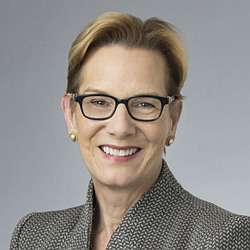Defining AI
In the debut episode of “Waking Up With AI,” Katherine and Anna highlight their expertise advising clients in the AI practice and address a particularly thorny issue in AI regulation and governance—how should we define AI?
- Guests & Resources
- Transcript
Katherine Forrest: All right, good morning, everyone. I'm Katherine Forrest ...
Anna Gressel: And I'm Anna Gressel.
Katherine Forrest: And we wanted to welcome you to our very first episode of a new podcast that's focused entirely on AI — with some legal sprinkling in there, because we both happen to be lawyers — called Waking Up with AI.
Anna Gressel: Katherine, should we tell everyone why we're here and why we decided to launch our own podcast series?
Katherine Forrest: I think we actually have to because when Anna and I had first come up with the idea of doing a podcast, we realized that so had everybody else. And so there's a lot of podcasts out there. And what we do is something a little bit different. What we're going to do is sort of a bite-sized podcast. It's going to be five to seven minutes long, one a week, that will focus on both the technology that people want to know about — what's happening in the AI sphere — and then combine that with spotting the legal issues and giving people really practical pointers about how they can take that technology, and take the legal pointers, and put them to use in their businesses. So it'll be the top technical and legal issues in AI.
Anna Gressel: And we're lucky to have clients across financial services, major tech companies, insurance, retail, entertainment, manufacturing. And so we're going to be talking about, really, what are some of the big industry trends here, why they matter, and try to give you everything you need to know in five to seven minutes. And if you're like me, you will listen over your first cup of coffee in the morning, which is why we wanted to call it “Waking Up with AI.”
Katherine Forrest: Although, Anna, I confess I'm actually on my second cup of coffee.
Anna Gressel: Oh, me too, I am, honestly.
Katherine Forrest: All right, so let's just say that we'll tell people a little bit about ourselves, but really if you want to know anything about Katherine Forrest or Anna Gressel, you can look us up on the website, so we don't have to do too much of that. Right now, 90% of my practice focuses on AI, though I still continue to do some other things.
But I’m a former federal judge. I spent some time at the Department of Justice. I write a lot about AI, some books, some articles. I do a lot of speaking on AI, a lot to judges, because once you've been a judge, it's really very interesting to go back and bring the new skills of AI into the judicial realm. So that's a little bit about my background. I'm very passionate about the technology of AI and I really try to keep on top of that by reading a lot of the technical articles. And Anna?
Anna Gressel: I'm Anna Gressel. I'm a counsel at Paul, Weiss. And really, my practice is quite like Katherine's. I'm so lucky to work with, I think, some of the coolest clients in the world. And we do everything from product counseling on AI, helping with companies to guide them towards their responsible deployment of AI. And we advise on IP issues, we advise on privacy issues, we advise on regulatory issues, with deep regulatory expertise in certain spaces. And we also do a lot of regulatory defense and litigation counseling.
So, really, kind of a broad practice. We talk a lot with regulators. I think one of the things that I quite like to do is regulatory roundtables or information sessions to help regulators really steer their regulation to the right landing spot. So it's a great practice. I'm sure you'll hear more about it as the podcast progresses, and we're happy to have you with us today.
Katherine Forrest: And I should also say that we're not lone wolves. We're part of, Anna and I are both part of, the Digital Technologies Practice Group here at Paul, Weiss. I run the AI portion of it along with somebody named Jonathan Ashtor, who we'll have on as a guest at some point, I am sure. And John Carlin runs the cybersecurity portion of our Digital Technologies Practice Group. And we've got a deep bench of talent and a Fintech practice that's won awards and on and on. So, we're thrilled to be here. And in each episode, we're going to try to bring you practical pointers, and to give you a little bit of information that will take you a little bit further each time. But we thought, today, Anna, that what we could do is — as our first practical pointer — talk about the definition of AI. And I say that, sort of, with like, the definition of AI, because there are so many definitions of AI, but at the same time, everybody really thinks that they understand the definition of AI. So, tell us your definition of AI.
Anna Gressel: Definitely. I mean, I would also even say that before we even say what the definition is, Katherine, don't you feel like this is becoming such a hot button issue with regulators kind of all around the world trying to align on definitions, and it's creating a lot of confusion — there are a lot of definitions out there. So, I think for companies figuring out a practical definition that's really workable is so important to make sure that, you know, you're really disseminating and a coherent message to the business actually. And you can get things in your inventory. You can align on what we're actually talking about here. I mean, AI could mean so many different things. So, what do we actually think it means? What is actually a practical definition? For me, my favorite is a tweak on the OECD definition. So, I'll give it to you, and I'll explain why I like that tweak. My definition is artificial intelligence is a machine learning technology that, for explicit or implicit objectives, infers from the input it receives how to generate output such as predictions, content, recommendations, or decisions that can influence physical or virtual environments. So, what's the tweak? The OECD definition uses this term “machine-based technology.” I personally prefer machine learning technology. And the reason for that is, I think machine-based could mean anything. It can mean really anything that runs on a computer. And I don't think that's what AI means. It's not really every spreadsheet with a formula. So, for us, we like machine learning. It essentially implies or connotes technology that learns from experience.
Katherine Forrest: And so again, I would just say that you really want to make sure that your internal corporate definition is matching up with what the regulators are asking for, with what the state laws are considering as the definition of AI. And so that's our first practical pointer, as a little teaser to get you in there, to listen to us and to turn this podcast on.
We'll be back and we'll be coming to you with some more AI practical pointers and information in our next podcast. So, thanks for joining us for Waking Up with AI, a Paul Weiss podcast hosted by Katherine Forrest ...
Anna Gressel: And Anna Gressel.
Katherine Forrest: Thank you very much.
















